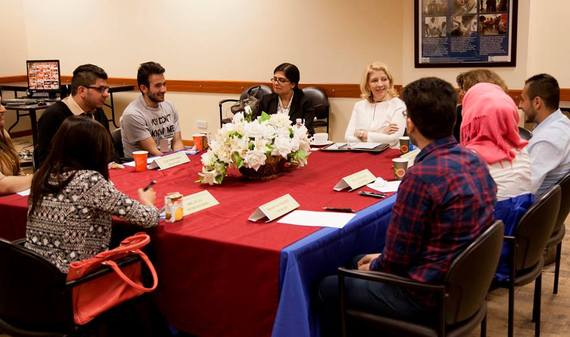 U.S. Ambassador-at-Large for Global Women's Issues Cathy Russell met with Iraqis during her trip to Baghdad earlier this year. (State Department Image)
U.S. Ambassador-at-Large for Global Women's Issues Cathy Russell met with Iraqis during her trip to Baghdad earlier this year. (State Department Image)
When Huda answered ISIL's knock on the door, she found men outside her home. Toting guns, they asked her why her son was in school instead of fighting alongside them. Women also came to Huda's home in Mosul, Iraq on behalf of ISIL. They came to size up her 10-year-old daughter for "marriage" to ISIL soldiers.
As a widow, Huda felt she had increasingly fewer options to save her sons and daughter from ISIL's clutches. She decided to flee her home, selling everything to fund the dangerous trip from Iraq to Amman, Jordan, where I met her on a recent trip to both countries. I was there to better understand the challenges facing Iraqi women and girls, particularly those forced to leave their homes because of ISIL.
Huda is one of the many Iraqi women I met who told me how ISIL makes life hell for women and girls. The situation is especially grim for minorities -- thousands of girls and women were abducted by ISIL last summer. Throughout their captivity, many, including girls as young as seven or eight, were repeatedly raped and forced to "marry" ISIL fighters. Some have been sold as slaves and transported to various locations in Iraq, Syria and beyond.
The hundreds of women and girls who have returned from ISIL captivity continue to suffer. Iraqis I met characterized some of the returned women and girls as "emotionally broken," some alone, still wearing the same clothes they had on during captivity.
This is tragic. The medical and psychosocial services available to meet the growing needs of the displaced community are limited, and their availability is not widely known. While I heard promising reports of the value of safe spaces and community centers in the camps during my trip, it was clear both the quantity and quality of services aren't meeting the particular needs of women and girls.
I met UN representatives who told me that beyond basic needs of food and housing, displaced girls and boys need education. But that's not easy, with over 500,000 school-age children in Iraq displaced and not enrolled in formal education. Overcrowded schools in areas like Iraqi Kurdistan are struggling to accommodate them. It doesn't help that the education portion of the UN appeal for Iraq is the most poorly funded part of the appeal to date.
The United States has taken action to help, providing both humanitarian aid and other assistance spanning several sectors, and we are committed to continuing our work with the Government of Iraq, NGO partners, and the UN to address the needs of those who are affected by what's happening in Iraq. But the international community needs to do more to protect and better serve women and girls affected by the conflict.
And we can't forget that women should be a part of all our efforts. On my last night in Baghdad, I met with a group of Iraqi women leaders to talk about their vision for the future of their country. Of course they were realistic about the challenges at hand. But they were also impatient for progress and determined to tackle the country's challenges. Most of all, they were hopeful -- for the future of Iraq and their own role in building national unity.
I won't soon forget the optimism of these leaders or the fortitude of Huda. I won't forget the boys and girls who are far away from their homes, not in school but in camps. And I can't forget the image of those ISIL women, knocking on doors in Mosul looking for young girls to be "brides."
I hope the rest of the world will also remember these stories. As we continue to assess and respond to what's happening in Iraq, we can't forget the importance of protecting and advancing the rights of women and girls to ensure a peaceful, stable future.
